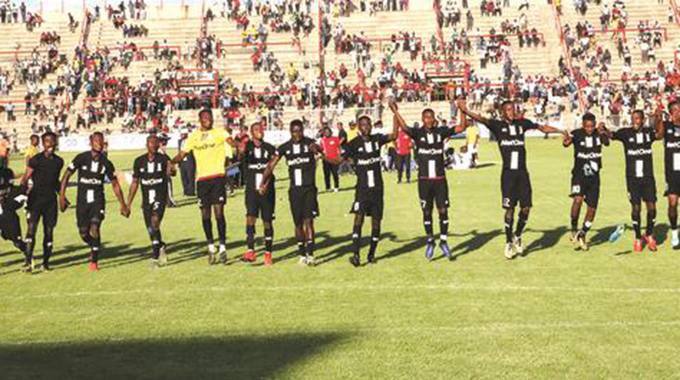From Hurst in ’66 to the Prince in 2019, football has always walked on a tightrope

Robson Sharuko Senior Sports Editor
IT was a classic recreation of Geoff Hurst’s controversial, yet ultimately decisive moment, in the 1966 FIFA World Cup final at Wembley.
The ball having a fleeting, yet controversial romantic flirtation with the woodwork as it kissed the underside of the crossbar, before bouncing onto the goal line.
More than half-a-century later, the world still talks about it — did the ball cross the line, to give England their third goal, in a game they eventually won 4-2 after extra-time?
Or, did it not?
Opinion remains deeply divided, even after countless reviews and studies, with one side convinced it was a ghost goal, which should never have stood.
While, there is also the other side which insists the ball, indeed, crossed the line.
Thousands of kilometres away from London, Highlanders were celebrating their 40th anniversary that year.
And, as the English celebrated their football’s Finest Hour, Bosso were, as far away from the glory fields of this game’s landscape, as could be possible.
After all, the dominant team in the City of Kings was called Bulawayo Rovers.
They had won the inaugural domestic national league championship four years earlier in 1962 and won it again in 1964.
In 1966, they were losing finalists, in the game that decided champions back then, to St Paul’s Musami.
They say life starts at 40.
And, for many in the Highlanders family, that was probably true.
After all, in 1966, a club from a rural setting won the domestic league crown for the only time in the championship’s history.
Bulawayo Rovers were dethroned that year, they would not win another league championship in their history, and the City of Kings was crying out for a new and fresh face to represent its football interests.
It came seven years later, with Bosso winning their first major domestic silverware when their Class of ‘73 won the Chibuku Cup, after thrashing favourites Mhangura 3-0 in the final at Rufaro.
With scores of hired buses ferrying fans from Bulawayo to Harare, and a special train service being added to the schedule to bring in more supporters, there was no question this was the coming of age of a city in this game.
Yes, Bulawayo Rovers and Bulawayo Sables has been league champions before, but this was bigger than all that because this was a city, not a club, finally making its mark on domestic football.
That’s the power of Highlanders, that’s the strength of a people’s team and that’s the difference between a football club and a national institution.
With the Germans, beaten finalists in that ‘66 World Cup final, set to host the tournament in 1974, it was inevitable Bosso’s triumph in ‘73 would come in the shadow of a raging global debate over Hurst’s controversial Wembley goal.
Little did the heroes of that landmark Highlanders success in ‘73 know that, 46 years down the line, their proud football club would also be the subject of a controversy over a goal like the one Hurst scored in ‘66.
Worse still, in the Chibuku Cup final, the very tournament they won to announce their arrival on the big stage.
To finally soak in that incredible winning feeling, which Hurst had given to the English, under a blaze of controversy, back in ‘66 when Bosso turned 40.
When Prince Dube fired goal-wards just before the break at a partying Barbourfields on Saturday, there was very little hint his effort would trigger a national debate dripping in controversy.
Or, revive that debate triggered, in the year Bosso turned 40, when Hurst slammed his effort against the crossbar at Wembley in that World Cup final.
Dube’s fierce effort beat Ngezi Platinum goalkeeper Nelson Chadya, who appeared badly positioned, crashed against the underside of the crossbar and bounced on the goal line.
The $225 000 question is — did it bounce over the goal line, for a goal, or not?
The reaction from the Bosso fans was that it did, the Prince, far away in the distance, wasn’t sure and delayed his celebrations as he checked on the officials.
Referee Brighton Chimene signalled a goal and it’s hard to accuse him of the kind of favouritism which has been laid on some match officials from
Bulawayo, and the Matabeleland provinces, when it comes to Bosso.
After all, Chimene is from Rusape.
It’s possible he might have been deceived by the bounce and so was his assistant referee and Ngezi Platinum coach Rodwell Dhlakama could be right that it wasn’t a goal. But, without VAR and all the videos we have seen so far coming from an amateurish one-dimensional coverage of the incident, it’s impossible to make a definitive conclusion. It’s very likely the ball didn’t cross the line, it’s also likely it did and on this one no one can suggest he or she has the best, and definitive, conclusion.
Dhlakama and his men will rightly feel they were robbed and there have been a number of people singing in their corner — a lot of it coming from those who, because of their club affiliations, didn’t want Goliath to win.
There are also many who are siding with Bosso and saying the Bulawayo giants won the game because they claim the ball crossed the line.
“Dear VAR, we just wanted to tell you that here in Zim we call you V11,” Bulawayo Chiefs tweeted the moment with an accompanying frozen picture of the moment.
“The dude in green is called Mr Chadya, he is a good goalie who was just caught off his line by a Prince from Bulawayo.”
Prince Dube chose to focus on the win.
“Bosso family, this (one) is for you and everyone around Zimbabwe who kept believing in us through good and bad times,” he tweeted.
He didn’t mention he has joined the company of the likes of Hurst whose controversial goal in the World Cup final in 1966 was given by Swiss referee Gottfried Dienst after consulting with his assistant Tofiq Bahramov of Azerbaijan.
“Was it a goal? Did the ball cross the line?” Hurst later asked in his book ‘1966 And All That.’ “Those two questions have haunted me for most of my adult life.
“Having listened to all the arguments over the decades and watched the replay hundreds of times on TV, I have to admit that it looks as though the ball didn’t cross the line. “But, until someone proves otherwise, I’m happy to go along with Herr Dienst and Bahramov.”
Three years ago, on the occasion of the 50th anniversary of that goal, Sky Sports commissioned a detailed study and concluded it had crossed the line.
“From Bobby Moore’s touch map to the state-of-the-art treatment of the infamous goal to the Russian linesman, Sky Sports opened their treasure chest of machinery to analyse England’s finest hour,” reported MailOnline.
“Using statistical data from Opta, the Sky Pad touch screen but virtual reality from EA Sports, Sportsmail’s Jammie Carragher and Sky’s Ed Chamberlain studied the action from Wembley 50 years ago when England beat West Germany 4-2 after extra time to become champions of the world.
“Sky’s treatment proved beyond doubt that Hurst’s second goal of the game did cross the line.”
The Prince’s recreation of Hurst’s moment is unlikely to receive such thorough examination, because the tools of making such a comprehensive and scientific analysis simply don’t exist here.
But, Bosso, just like England before them, won’t care and there are some who will see some superstitious connection.
Highlanders were 40 when Hurst scored that goal, another 40 years later, in 2006, Bosso were crowned champions of domestic football. Thirteen years later, as if this was some sort of reminder of the number of the jersey their iconic forward Adam Ndlovu used to wear in national colours, Bosso fittingly closed a decade which started in tragedy, with Adamski’s death, with a grand victory.
This, in more ways than one, appeared written in the stars for them.










Comments